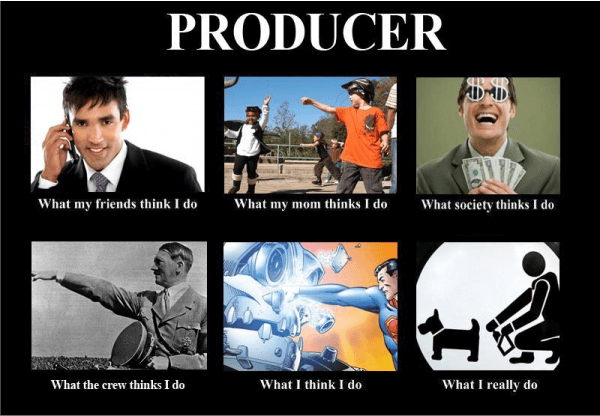Producer Definition
A producer is an individual or company responsible for overseeing and managing the creation and delivery of a product or service. In the entertainment and media industries, a producer typically oversees the development, financing, and production of films, television shows, music albums, or other types of content. They are liable for overseeing financial plans, recruiting ability, and planning with other colleagues, and it is fulfilled to guarantee that time constraints. The role of a producer can vary depending on the industry and project. Still, their overall goal is to ensure that the final product meets the desired quality standards and is delivered on time and within budget.

As a producer, your role can vary depending on the industry and type of project you are working on. In the entertainment industry, for example, a producer may be responsible for securing financing, developing scripts, hiring actors and crew, and overseeing the production process from start to finish. In the corporate world, a producer may oversee the creation of marketing materials, events, or training videos.
Key Skills that a Successful Producer Should Have Included
- Leadership: Producers must be able to lead and motivate a team of people to work together towards a common goal. This requires strong communication skills, the ability to delegate tasks effectively, and the ability to make decisions under pressure.
- Organization: Producers must be highly organized and detail-oriented to manage budgets, schedules, and multiple tasks simultaneously.
- Creativity: Producers must be able to think creatively and develop innovative solutions to problems that may arise during the production process.
- Financial Acumen: Producers must understand finance and budgeting well to manage project costs and ensure that the final product is delivered within budget.
- Flexibility: Producers must be able to adapt to changes in schedules, budgets, or project scope and be able to make quick decisions when necessary.

- A successful producer requires creativity, leadership, organization, financial understanding, and the ability to work well under pressure and adapt to changing circumstances.
- In addition to the skills mentioned earlier, a successful producer must also have a deep understanding of the industry they are working in. This includes keeping up with current trends and changes in the market, understanding the target audience, and effectively promoting and distributing the final product.
- Another important aspect of being a producer is networking and building relationships with industry professionals. This can include agents, distributors, financiers, and other producers. Building strong relationships with these individuals can help open up new opportunities and lead to future collaborations.
- Producers must also have strong negotiation skills to secure funding, contracts, and distribution deals. This requires the ability to communicate, build rapport, and understand the needs and motivations of the other party.
- Finally, a successful producer must be passionate about the project they are working on. This passion helps drive them through the long hours, tight deadlines, and difficult decisions that often come with the role. It also helps to inspire and motivate the team to deliver their best work.
Overall, being a producer is a challenging and rewarding role that requires a combination of creativity, leadership, financial acumen, and industry knowledge. It is a role that requires both strategic thinking and the ability to be flexible and adapt to changing circumstances to deliver a successful final product.
Some Other Definition of Producer
- Entertainment Industry: In the entertainment industry, a producer is a person or company responsible for overseeing and managing the production of films, television shows, music albums, or other types of content. They may be involved in securing financing, hiring talent, managing budgets, and overseeing the creative process.
- Agriculture: A producer is a person or company that grows or raises crops or livestock for sale. They may manage the land, select the right seeds or animals, and ensure that the final product meets quality standards.
- Manufacturing: In manufacturing, a producer is a company that produces goods for sale. They may be involved in designing the product, sourcing raw materials, managing production processes, and distributing the final product.
- Economics: In economics, a producer is a person or company that creates goods or services for sale. This can include anything from a small business owner to a large corporation.
- Music Industry: In the music industry, a producer is a person who oversees the recording, mixing, and mastering of music. They may work with the artist to develop the sound and style of the music and may be involved in selecting and hiring session musicians.
Overall, the term "producer" can refer to a wide range of roles and responsibilities depending on the industry and context in which it is used.
Types of Producer

- Executive Producer: The Executive Producer is the highest-ranking producer in the production process. They are responsible for providing overall guidance and leadership to the production team, securing financing, managing budgets, and ensuring that the final product meets the desired quality standards. They may also be involved in developing the concept and selecting key production team members.
- Line Producer: The Line Producer is responsible for overseeing the day-to-day operations of the production. They manage the shoot's budget, schedule, and logistics and work closely with the director to ensure the creative vision is realized on time and within budget.
- Associate Producer: The Associate Producer is a mid-level producer who works closely with the Executive and Line Producers to assist in the planning and execution of the production. They may be responsible for researching and developing concepts, scouting locations, and assisting with budgeting and scheduling.
- Music Producer: The Music Producer oversees music recording, mixing, and mastering. They work with the artist to develop the sound and style of the music and may be involved in selecting and hiring session musicians.
- Video Game Producer: The Video Game Producer is responsible for overseeing the development of a video game from concept to completion. They work with designers, developers, and artists to ensure the game is fun, engaging, and meets the desired quality standards.
Overall, the type of producer and their responsibilities will vary depending on the industry and project they are working on. However, each type of producer plays an essential role in ensuring that the final product is delivered on time and meets the desired quality standards.
Role of Producer
The role of a producer can vary depending on the industry and type of production they are working on. However, here are some common roles and responsibilities that a producer might have:
- Develop the Concept: The producer may work with a writer, director, or other creative team members to develop the initial concept for the production. This may include developing the story, characters, or themes.
- Secure Financing: The producer is responsible for securing financing for the production. This may involve pitching the concept to investors, securing loans, or finding sponsors.
- Manage the Budget: The producer is responsible for creating and managing the budget for production. They must allocate funds for various expenses such as salaries, equipment, and location fees while ensuring that the production stays within budget.

- Hire the Crew: The producer may hire the crew for the production. This can include the director, cinematographer, production designer, and other key crew members.
- Oversee the Production: The producer oversees the production from start to finish. This may include coordinating the schedule, managing logistics, and ensuring that everything runs smoothly on set.
- Manage Post-Production: After filming, the producer manages the post-production process. This may include editing, sound design, and visual effects.
- Market and Distribute the Production: The producer may be responsible for marketing and distributing the product. This may involve working with a distributor to secure a distribution deal or promoting the product through advertising and other promotional activities.
Overall, a producer's role is essential to a production's success. They are responsible for managing the production's financial and creative aspects while ensuring that everything runs smoothly and that the final product meets the desired quality standards.
Conclusion
A producer is a person or entity that oversees and manages the production of a product or service. The role of a producer can vary depending on the industry and type of production they are working on. However, common responsibilities may include developing the concept, securing financing, managing the budget, hiring the crew, overseeing the production, managing post-production, and marketing and distributing the final product. A producer is essential in ensuring a product succeeds and meets the desired quality standards.
|



 For Videos Join Our Youtube Channel: Join Now
For Videos Join Our Youtube Channel: Join Now











